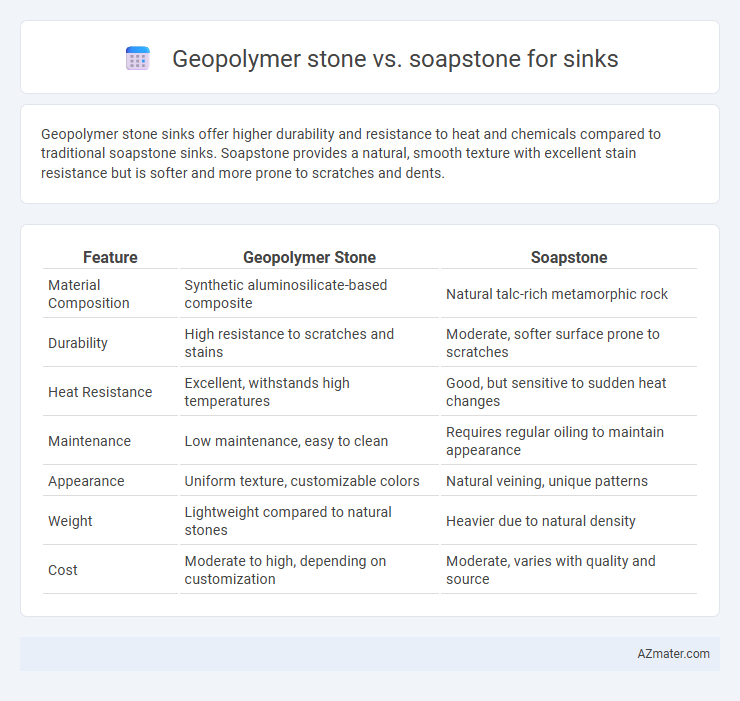Geopolymer stone sinks offer higher durability and resistance to heat and chemicals compared to traditional soapstone sinks. Soapstone provides a natural, smooth texture with excellent stain resistance but is softer and more prone to scratches and dents.
Table of Comparison
| Feature | Geopolymer Stone | Soapstone |
|---|---|---|
| Material Composition | Synthetic aluminosilicate-based composite | Natural talc-rich metamorphic rock |
| Durability | High resistance to scratches and stains | Moderate, softer surface prone to scratches |
| Heat Resistance | Excellent, withstands high temperatures | Good, but sensitive to sudden heat changes |
| Maintenance | Low maintenance, easy to clean | Requires regular oiling to maintain appearance |
| Appearance | Uniform texture, customizable colors | Natural veining, unique patterns |
| Weight | Lightweight compared to natural stones | Heavier due to natural density |
| Cost | Moderate to high, depending on customization | Moderate, varies with quality and source |
Introduction to Geopolymer Stone and Soapstone
Geopolymer stone is an engineered material composed of industrial byproducts like fly ash and slag, formulated through a chemical process to create a dense and durable surface ideal for sinks. Soapstone, a natural metamorphic rock primarily composed of talc, offers a smooth, heat-resistant, and non-porous surface commonly used in kitchen sinks and countertops. Both materials provide durability and aesthetic appeal, but geopolymer stone's engineered composition allows for more customizable designs, while soapstone is prized for its natural veining and warm tactile feel.
Material Composition and Properties
Geopolymer stone is an engineered material composed primarily of aluminosilicate minerals activated by alkaline solutions, offering high compressive strength, chemical resistance, and heat tolerance ideal for sinks. Soapstone, a natural metamorphic rock made mostly of talc and magnesium silicate, is prized for its smooth texture, resistance to stains, and moderate heat resistance but is softer and more prone to scratching compared to geopolymer stone. The synthetic composition of geopolymer stone allows for enhanced durability and customization, whereas soapstone's natural origins offer unique aesthetics and a warmer hand feel.
Durability and Longevity Comparison
Geopolymer stone sinks exhibit exceptional durability due to their engineered composition, offering high resistance to cracking, chipping, and heat, making them ideal for long-term kitchen and bathroom use. Soapstone sinks, while naturally durable and resistant to stains and acids, are softer and more prone to scratches and surface wear over time compared to geopolymer alternatives. Overall, geopolymer stone provides superior longevity and robustness, ensuring sustained performance under heavy use, whereas soapstone requires more maintenance to preserve its appearance and structural integrity.
Aesthetic Appeal and Design Options
Geopolymer stone sinks offer high versatility with customizable colors and textures, allowing designers to achieve modern, sleek aesthetics that emulate concrete or natural stone finishes. Soapstone sinks provide a timeless, rustic appeal with soft, natural veining and a warm, matte surface that develops a unique patina over time. While geopolymer stone supports innovative, contemporary designs with precise shapes, soapstone emphasizes organic forms and classic charm, catering to different aesthetic preferences and interior styles.
Resistance to Stains and Chemicals
Geopolymer stone exhibits superior resistance to stains and chemicals due to its dense, non-porous structure, making it highly durable against acidic substances and everyday kitchen spills. Soapstone, while naturally resistant to mild acids and alkalis, is more porous, which can lead to staining if not regularly sealed and maintained. For sinks exposed to harsh cleaning agents and frequent staining risks, geopolymer stone offers a more resilient and low-maintenance option compared to soapstone.
Maintenance and Cleaning Requirements
Geopolymer stone sinks require minimal maintenance due to their non-porous surface, resisting stains and microbial growth without the need for sealants. Soapstone sinks demand regular oiling to maintain their natural luster and help prevent surface scratches, although their dense composition resists bacterial buildup and staining effectively. Both materials clean easily with mild soap and water, but geopolymer stone offers superior durability and lower upkeep, making it ideal for busy kitchens.
Environmental Impact and Sustainability
Geopolymer stone sinks offer a lower environmental impact compared to soapstone due to their production from industrial byproducts like fly ash, which reduces waste and conserves natural resources. Soapstone, a natural stone, requires quarrying that can lead to habitat disruption and higher carbon emissions. Geopolymer sinks typically have a smaller carbon footprint and promote sustainability by utilizing recycled materials and reducing extraction from the earth.
Cost Analysis and Value for Money
Geopolymer stone sinks typically cost 20-30% less than soapstone sinks while offering comparable durability and aesthetic appeal. Soapstone, valued for its natural resistance to heat and stains, demands higher upfront investment but often yields longer-term value through minimal maintenance costs. Budget-conscious buyers seeking a balance between cost and longevity may find geopolymer sinks deliver superior value for money without compromising essential functionality.
Installation Process and Flexibility
Geopolymer stone sinks offer a lightweight and easy installation process due to their engineered composition, allowing for precise custom shapes and sizes that fit various countertop designs. Soapstone sinks, while durable, require more careful handling and professional installation because of their brittleness and heavier weight, limiting flexibility in shape alterations. The flexibility of geopolymer stone makes it ideal for modern kitchen designs needing bespoke solutions, whereas soapstone suits traditional styles where standard forms are preferred.
Choosing the Best Sink Material for Your Needs
Geopolymer stone offers exceptional durability and stain resistance, making it an ideal choice for sinks in high-traffic kitchens, while soapstone provides a natural, smooth surface with excellent heat resistance and antimicrobial properties. Choosing between geopolymer stone and soapstone depends on your priority for maintenance ease and design preference; geopolymer stone requires less upkeep, whereas soapstone develops a unique patina over time that adds character. Assess your lifestyle needs, cleaning habits, and aesthetic goals to determine the best sink material that balances functionality with long-term appeal.

Infographic: Geopolymer stone vs Soapstone for Sink
 azmater.com
azmater.com